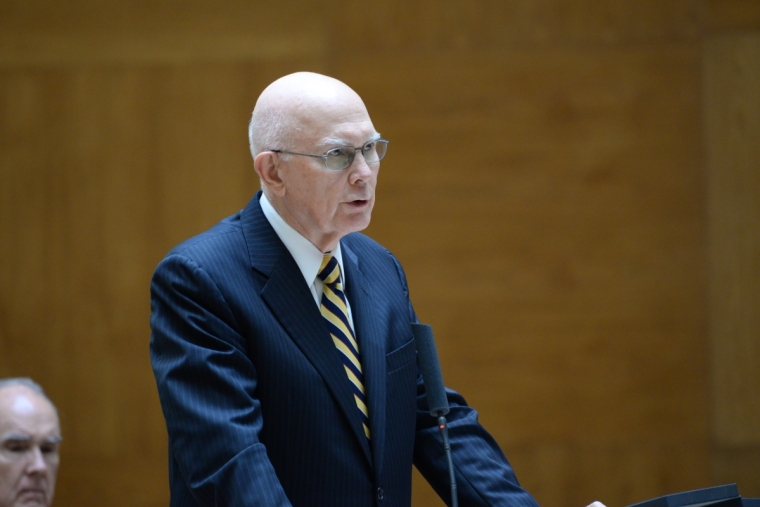Mormon leader calls out Christian clerk Kim Davis

SALT LAKE CITY (Christian Examiner) – He didn't mention Kentucky's Rowan County Clerk Kim Davis by name, but a high-ranking official in the Church of Jesus Christ of Latter Day Saints fired a salvo at those who promote "belligerence between religion and government" during a speech in California last week.
The church's news service said Elder Dallin Oaks, one of the "Quorum of the Twelve Apostles" of the Mormon Church, was clearly referencing Davis when he told the Sacramento Court/Clergy Conference at a Jewish synagogue that public officials must obey the law, in spite of their religious objections.
"Office holders remain free to draw upon their personal beliefs and motivations and advocate their positions in the public square. But when acting as public officials they are not free to apply personal convictions — religious or other — in place of the defined responsibilities of their public offices," Oaks told the group at Congregation B'nai Israel.
"A county clerk's recent invoking of religious reasons to justify refusal to issue marriage licenses to same-gender couples violates this principle," Oaks said.
Office holders remain free to draw upon their personal beliefs and motivations and advocate their positions in the public square. But when acting as public officials they are not free to apply personal convictions — religious or other — in place of the defined responsibilities of their public offices. ... A county clerk's recent invoking of religious reasons to justify refusal to issue marriage licenses to same-gender couples violates this principle.
Davis refused to issue marriage licenses to gay couples in her country after the Supreme Court ruled gay marriage legal nationwide in Obergefell v. Hodges. Davis said same-sex marriage violated God's law and, therefore, her beliefs as a Christian. Davis was sentenced to five days in jail on a contempt charge for refusing a federal judge's order to issue the licenses.
Oaks said obedience to the law would ensure society lives together in "happiness, harmony and peace," even if the church disagrees with the laws government passes.
"Parties with different views on the relationship between church and state should advocate and act with civility. ... We all lose when an atmosphere of anger or hostility or contention prevails," he said. "We all lose when we cannot debate public policies without resorting to boycotts, firings, and intimidation of our adversaries."
Oaks said he had viewed separation of church and state from both sides of American life – as a religious leader and through the courts, prior to his being named an "apostle" of the Mormon Church in 1984. He served as a law clerk to Chief Justice Earl Warren of the U.S. Supreme Court, a prosecutor in Illinois and as a justice on the Utah Supreme Court.
"There should be no belligerence between religion and government," Elder Oaks said. "Governments and their laws can provide the essential protections for believers and religious organizations and their activities. Believers and religious organizations should recognize this and refrain from labeling governments and laws and officials as if they were inevitable enemies."
Although he did not name specific governors or attorneys general by name, Oaks also said both state officials should not refuse to enforce or defend a law on personal grounds, whether the reason is secular or religious.
"Constitutional duties, including respect for the vital principle of separation of powers, are fundamental to the rule of law. Government officials must not apply these duties selectively according to their personal preferences — whatever their source," he said.
Oak's full address is available here.
Though the Mormon Church asserts its position as a Christian denomination, most historic Christian denominations reject the claim while attempting to find common ground to work on social issues. The church's doctrines deny many tenets of historic Christianity, while affirming doctrines not found in Scripture.